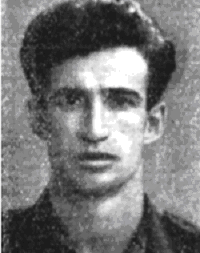 The son of Goldie and Max, Harold Monash was born on January1st 1924, in Berlin, Germany. He studied at junior and high schools in Berlin until moving to the USA in 1936. His departure from Germany was made possible by an American aid organization. Until his parents arrived in New York in 1940, he stayed with family. From 1939-43 he studied at a Technical High School and completed his studies as a certified electrician with excellent grades
The son of Goldie and Max, Harold Monash was born on January1st 1924, in Berlin, Germany. He studied at junior and high schools in Berlin until moving to the USA in 1936. His departure from Germany was made possible by an American aid organization. Until his parents arrived in New York in 1940, he stayed with family. From 1939-43 he studied at a Technical High School and completed his studies as a certified electrician with excellent grades
In February 1943 he joined the American Army and became of a member of a Ranger unit. In July of that year, he was sent to Italy with the rank of corporal. His battalion suffered heavy losses and he was one of only 50 men who survived. He volunteered for a paratrooper company, and captured three Nazi soldiers in the battle at Anzio Beachhead in Italy, for which he received the Medal for Excellence¹. He was severely injured in the battle for Rome, and received the Purple Heart Medal. He returned to the U.S. to recuperate, a lengthy process. In the last days of his army service, he served as an officer in the camps holding German prisoners of war.
On his release from the army, he planned to make aliyah to Palestine and to complete his studies at the Technion in Haifa. For this purpose he studied Hebrew in a special course at a Rabbinical college. He joined a youth movement and then volunteered as a crewman on the Aliyah Bet ship “Haganah” which sailed from France, and after his arrival in 1946, he began his studies. After a year’s study at the Technion, he joined a kibbutz in order to get to know the country.
At the outbreak of the War of Independence, he joined the Palmach and served in Hativat Harel, and was sent to the battlefront in the Jerusalem sector. When asked why he was here in a foreign army by a Jew who fought alongside him, the poetry of his youth inspired him, and he replied, “for the benefit of the country of my birth.” He sealed this holy covenant on his death as a hero on April 23rd, 1948.
Towards the end of April 1948, Operation “Yabusi” was carried out in the Jerusalem sector; its aim was to link the territorial area of the Jewish population in the city to the settlers in the north of Jerusalem. For the purpose of this operation, Hativat Harel moved to Jerusalem and on the night between 22nd and 23rd April, they attacked Shu’afat, Beit Iksa, and Nebi Samuel. The assault at dawn on Nebi Samuel was badly timed, and heavy enemy fire forced the troops to retreat after suffering heavy casualties. Zvi fell in this attack.
He was laid to rest in the military cemetery at Kibbutz Kiryat Anavim and promoted posthumously to the rank of Lieutenant.
In the book Underground to Palestine, the American journalist I.F. Stone wrote the following about Monash:
He was one of the few who survived Anzio Beachhead. His shipmates were proud of him, but it was hard to get him to talk about his experiences. He spoke of his many missions behind the German lines laconically: “Aw, it was just routine work. You don’t want to hear about that.” But his shipmates told me that he once lured 3 Germans over the American lines by pretending to be a Wehrmacht officer in the darkness.
The Ranger, as we called him, did tell me about one of his experiences which he didn’t consider routine.
His outfit was destroyed during the Anzio landing. After his escape from Anzio a soldier walked up to him and asked what outfit he was in. He said, “I’m a Ranger.”
“This other soldier took a look at me,” he went on, “and asked, `What’s your religion?’ I said, “I’m a Jew.’
“He said, `How come a Jew got into the Rangers?’
“I was so mad I pulled out my revolver and would have shot him, but my buddies interfered and held my arms, and my lieutenant walked up and knocked him out with a sock on the jaw.”
Translated from the Yizkor Web site, with ¹ the passage from “The Jews’ Secret Fleet” (Hochstein, Joseph M./Greenfield, Murray S, Jerusalem: Gefen Publishers. New York: Hewlett, updated 1999.)

